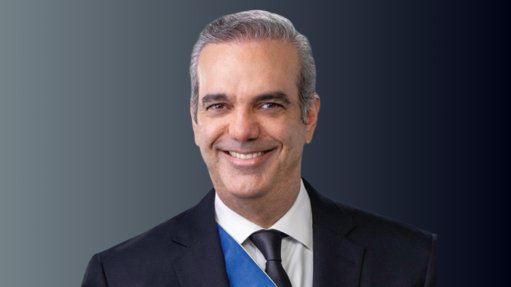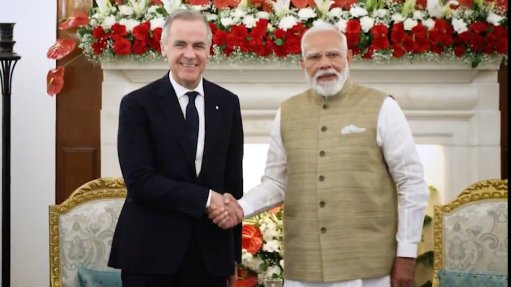Khwelamet ferromanganese revival will begin minute Eskom gives feasible power rate

Menar MD Vuslat Bayoglu interviewed by Mining Weekly's Martin Creamer. Video: Darlene Creamer.
JOHANNESBURG (miningweekly.com) – The minute that Eskom gives Khwelamet an economically feasible power price, the refurbishing of two of the four furnaces at the dormant former Metalloys plant in Meyerton will begin and take six to nine months to complete.
In the meantime, Khwelamet is focusing on a rehabilitation programme, with work being done on the large volume of on-site furnace slag – which can be beneficiated and sold as 73% to 74% alloy – as well as on operational discard that can be used in the cement market.
But the ultimate aim is to prepare the whole operation to be restarted as soon as possible.
“Eskom’s very helpful and is excited as we are because they want to get the smelters back into the business,” Menar MD Vuslat Bayoglu told Mining Weekly in a Zoom interview (Also watch attached Creamer Media video.)
The previous owner, Samancor Manganese, is credited with having kept the operations and everything on site in good condition, including the rail siding that is connected to the national rail network.
Raw manganese ore will be railed in from the Northern Cape for beneficiation into ferromanganese, which will be railed to either Durban or Richards Bay for export.
“Transnet is also very helpful. Immediately they heard about the deal, they came to the party and they said how can we help you because it’s a business they ran before and they would like to help us to make it work, so the vibe is there to make sure this business is restarted so that it can be a good example of reindustrialisation in South Africa.
“We’ve got all the ingredients. We just need to make sure we have the right priced power and we’ve got consistent power,” Bayoglu emphasised.
Mining Weekly: Given the considerable energy intensity of the ferroalloys sector, how do you foresee Eskom's performance impacting the industry in the future?
Bayoglu: Eskom has improved a lot compared with the past. Their loadshedding is less than what we were having in the past, but I’m not sure if they have really reached a stage where we should not be worried about loadshedding again. The reason why most of the smelters in the ferroalloys sector were closed was because Eskom couldn’t give them consistent power and Eskom couldn’t give them cheap power. If you look at the current price, which is between R1.60 per kilowatt hour (kWh) and R1.80/kWh, I think that price is still a good price if you compare it with other countries, especially in Europe. But it’s not competitive enough for smelters to restart or survive in a competitive market, especially coming from China and India. Our competitors are mainly Chinese ferrochrome smelters and Indian ferromanganese and ferrochrome smelters and they’re getting power at a very competitive price from either the private sector or government, and we don’t have that in South Africa yet. But Eskom is determined to help the ferroalloy industry and to come up with the right price and consistent power. But I still have some question marks regarding the future of Eskom because they need to make it clear as to how they are going to generate power. I think they’re trying their best in terms of creating capacity under renewable energy and putting that renewable energy to the grid but they must also be clear on what’s going to happen with baseload capacity. I think we’re all waiting for the Integrated Resource Plan (IRP) to be published. With that IRP, we’ll all see what they’re planning. It’s either nuclear or the current coal fleet to be refurbished or a new coal fleet to be started, obviously with the help of renewable energy, which will help us to transition from fossil fuels to cleaner sources of energy. But I think there’s still a question mark and we’ll see with the IRP what’s going to happen, but I think Eskom’s going in the right direction at the moment and I’m very hopeful that they’ll be a catalyst in terms of reindustrialising South Africa when it comes to the ferroalloys industry.
Weak prices and high production costs have also constrained South Africa's ferrochrome industry. Do you think the government's proposed interventions – such as export tariffs on raw chrome ore – will turn things around?
I think it will play an important role. I think protectionism is dangerous but we’re living in a very interesting world at the moment, because the biggest economy in the world is trying to protect their economy with all the tariffs that the Trump administration is coming up with, and South Africa needs to do something to protect its ferrochrome, ferromanganese and ferrovanadium industries. It’s very important for us, because our mining industry is critical for our economy. That’s our backbone, so we can’t afford to do nothing and wait or go with the flow. Eskom’s price is critical. Eskom needs to supply cheap power to the ferroalloys industry, including ferrochrome. Eskom needs to supply baseload power without any interruption and they should not say to the ferroalloys industry, don’t run the furnaces during winter. That should stop because winter stoppage has made the smelters become very uncompetitive. When it comes to tariffs on raw chrome ore exports, one has to be careful because we have a massive platinum industry in this country, and sometimes platinum prices are low and chrome, as a byproduct, helps the platinum miners. So, when I say, for instance, that it’s a great idea to put tax on chrome being sold as raw ore, I should be very careful in saying that. It might not be the right thing to say. But there’s another problem on the other hand, and the problem is, if we carry on supplying chrome ore in raw form instead of beneficiating, which can create five times more value by the way, that’s not right for South Africa. So, we need to find a balance, which could be for the capacity that we have in South Africa, I think this ore should be supplied by the chrome mining industry. I think the Department of Trade, Industry and Competition and the industry need to come to an arrangement instead of saying tax is not right. Yes, the tax is not right for platinum miners, but tax is right for the ferrochrome industry and for the general benefit of the South African public because if we carry on with this trend, there’ll be no ferrochrome smelters left in South Africa, which means jobs are lost, contractors lose value, and communities lose a lot, because especially Glencore and Samancor are doing a great job for the economy of the country, for communities, and for the thousands of people they employ, so we can’t afford not to look at the details of this thing and say we can’t put a tariff on the export of raw ore. I think we need to find a balance in between a tax on raw chrome ore exportation versus making sure there’s guaranteed supply for local beneficiation.
National Treasury recently announced a R10-billion loan from Germany to help South Africa transition away from fossil fuels. What are your thoughts on that?
I think South Africa is trying its best to do the energy transition and I think that’s a good thing for South Africa because the whole world is trying to transition from fossil fuels to cleaner energy sources and we’ve got enough solar capacity and wind capacity, especially on the south-east and south-west coasts of South Africa. I think it’s a good thing that we get support from Germany. However, we need to be careful with baseload capacity. Germany is in trouble because their power price is the most expensive in Europe, plus they’ve had instability in their power grid because of depending heavily on renewable-energy sources. They invested heavily in about 170 000 MW of wind and solar capacity, which is massive. We should not make the same mistakes as Germany in terms of baseload. I think the energy transition will eventually happen across the world. We cannot escape that but we need to ask the question to ourselves about how soon will it happen in South Africa. If we push too hard, are we going to create a problem similar to the one Germany has now? Germany’s sitting with a 6% unemployment rate, and we’re sitting with a 32% unemployment rate, so we cannot afford to make a mistake. When Germany makes such mistakes, their unemployment rate might go up, but ours is already the worst in the world, so we can’t afford to make a mistake. The question I’m asking is how should we rush into this energy transition thing? Do we really need to rush into the energy transition or should we try to use all the power resources, wind, solar, coal, nuclear, gas if we can get it at the right price, or should we look at how we can diversify our sources of energy and make sure we get the best out of all these different sources? So, I think it’s a good thing to work with Germany in terms of this energy transition support but we must not forget that Germany is not one of the most successful countries when it comes to energy transition.
Artificial intelligence and other digital technologies are driving global energy demand. How do you think South Africa and other African countries should secure their energy supply in this context?
Artificial intelligence needs a lot of data centres and data centres require a lot of power. In the United States alone, the demand coming from data centres is about 180 TWh a year, and it’s increasing. The US is using about 45% of the global energy that is used in data centres. The other two big players are China and Europe. Data centres are starting and spreading very fast. In China, the demand from data centres has increased 15% every year since 2004. This is a big business and one needs to look at how Africa and South Africa can benefit from this. It means employment, it means growth in GDP. But a critical question is that these data centres need uninterrupted power, almost like smelters, but even worse than smelters because smelters can be stopped, but data centres you can’t stop. So, if you need uninterrupted power, I go back to my earlier comment, we need all forms of energy to feed this energy-hungry world, including data centres, so we cannot say let’s not do coal or let’s not do nuclear because it’s dangerous. We need to look at how we can make coal less polluting. On top of all these renewable-energy sources that we are trying our best to generate in South Africa, what else can we do to make sure that coal is cleaner or nuclear energy is less dangerous so that we can have cheap and consistent power and we can grow our economy and employ more people. Data centres need all forms of energy and if you want data centres in South Africa as well, then we need to make sure that Eskom, and potentially also the private sector in the future, operate more efficiently and use diversified energy sources so we don’t have issues with loadshedding.
Article Enquiry
Email Article
Save Article
Feedback
To advertise email advertising@creamermedia.co.za or click here
Press Office
Announcements
What's On
Subscribe to improve your user experience...
Option 1 (equivalent of R125 a month):
Receive a weekly copy of Creamer Media's Engineering News & Mining Weekly magazine
(print copy for those in South Africa and e-magazine for those outside of South Africa)
Receive daily email newsletters
Access to full search results
Access archive of magazine back copies
Access to Projects in Progress
Access to ONE Research Report of your choice in PDF format
Option 2 (equivalent of R375 a month):
All benefits from Option 1
PLUS
Access to Creamer Media's Research Channel Africa for ALL Research Reports, in PDF format, on various industrial and mining sectors
including Electricity; Water; Energy Transition; Hydrogen; Roads, Rail and Ports; Coal; Gold; Platinum; Battery Metals; etc.
Already a subscriber?
Forgotten your password?
Receive weekly copy of Creamer Media's Engineering News & Mining Weekly magazine (print copy for those in South Africa and e-magazine for those outside of South Africa)
➕
Recieve daily email newsletters
➕
Access to full search results
➕
Access archive of magazine back copies
➕
Access to Projects in Progress
➕
Access to ONE Research Report of your choice in PDF format
RESEARCH CHANNEL AFRICA
R4500 (equivalent of R375 a month)
SUBSCRIBEAll benefits from Option 1
➕
Access to Creamer Media's Research Channel Africa for ALL Research Reports on various industrial and mining sectors, in PDF format, including on:
Electricity
➕
Water
➕
Energy Transition
➕
Hydrogen
➕
Roads, Rail and Ports
➕
Coal
➕
Gold
➕
Platinum
➕
Battery Metals
➕
etc.
Receive all benefits from Option 1 or Option 2 delivered to numerous people at your company
➕
Multiple User names and Passwords for simultaneous log-ins
➕
Intranet integration access to all in your organisation



















